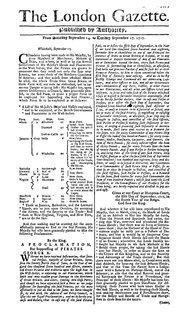Related Research Articles
Captain Benjamin Hornigold (1680–1719) was an English pirate who operated during the tail end of the Golden Age of Piracy.

Charles Vane was an English pirate who operated in the Bahamas during the end of the Golden Age of Piracy.
Henry Jennings was an 18th-century English privateer from the colony of Bermuda, who served primarily during the War of the Spanish Succession and later served as leader of the pirate haven or "republic" of New Providence.

The Republic of Pirates was the base or stronghold of a loose confederacy run by privateers-turned-pirates in Nassau on New Providence island in the Bahamas for about eleven years from 1706 until 1718. While it was not a republic in a formal sense, it was governed by an informal pirate code, which dictated that the crews of the Republic would vote on the leadership of their ships and treat other pirate crews with civility.
Christopher Winter was an English pirate active in the Caribbean. He is best known for sailing in Spanish service and launching the career of Edward England.
Leigh Ashworth was a pirate and privateer operating in the Caribbean in the early 1700s.

The Flying Gang was an 18th-century group of pirates who established themselves in Nassau, New Providence in The Bahamas after the destruction of Port Royal in Jamaica. The gang consisted of the most notorious and cunning pirates of the time, buccaneers who terrorized and pillaged the Caribbean until the Royal Navy and infighting brought them to justice. They achieved great fame and wealth by raiding salvagers attempting to recover gold from the sunken Spanish treasure fleet. They established their own codes and governed themselves independent from any of the colonial powers of the time. Nassau was deemed the Republic of Pirates as it attracted many former privateers looking for work to its shores. The Governor of Bermuda stated that there were over 1000 pirates in Nassau at that time and that they outnumbered the mere hundred inhabitants in the town.

Captain Napin was a pirate active in the Caribbean and off the American east coast. He is best known for sailing alongside Benjamin Hornigold.
Francis Leslie was a pirate active in the Caribbean. He is best known as one of the leaders of the "Flying Gang" of pirates operating out of New Providence.
Josiah Burgess (1689–1719) was an English pirate active in the Caribbean. He is best known as one of the heads of New Providence’s “Flying Gang.”
Nicholas Woodall was a pirate and smuggler active in the Caribbean. He is best known for his involvement with Charles Vane and Benjamin Hornigold.
Daniel Stillwell was a minor pirate in the Caribbean, best known for his association with Benjamin Hornigold.
John Cockram was a pirate, trader, and pirate hunter in the Caribbean, best known for his association with Admiral Benjamin Hornigold.
John West was a minor pirate in the Caribbean, best known for his association with Benjamin Hornigold.
Paulsgrave Williams, first name occasionally Paul, Palsgrave, or Palgrave, was a pirate who was active 1716–1723 and sailed in the Caribbean, American eastern seaboard, and off West Africa. He is best known for sailing alongside Samuel Bellamy.
William Fox was a pirate active in the Caribbean and off the African coast. He was indirectly associated with a number of more prominent pirates such as Bartholomew Roberts, Edward England, and Richard Taylor.
Phineas Bunce was a pirate active in the Caribbean. He was pardoned for piracy but reverted to it immediately afterwards and was killed by a Spanish pirate hunter.
Francis Fernando was a Jamaican pirate and privateer active in the Caribbean. He was one of the few confirmed mixed-race Captains in the Golden Age of Piracy.

The Proclamation for Suppressing of Pirates was issued by George I of Great Britain on 5 September 1717. It promised a royal pardon for acts of piracy committed before the following 5 January to those pirates who surrendered themselves to the correct authority before a deadline. Originally, the surrender had to occur on or before 5 September 1718; this was later extended by a second proclamation to 1 July 1719.
References
- 1 2 Brooks, Baylus C. (6 March 2017). Quest for Blackbeard: The True Story of Edward Thache and His World. Lulu Press, Inc. ISBN 9781365795923 . Retrieved 15 October 2017.
- ↑ Zuidhoek, Arne. "A-Z Pirate Encyclopedia". www.zuidhoek.nu. Retrieved 15 October 2017.
- 1 2 ""The Strongest Man Carries the Day," Life in New Providence, 1716-1717". Colonies, Ships, and Pirates. 26 July 2015. Retrieved 15 October 2017.
- ↑ Craton, Michael (1992). Islanders in the Stream: From aboriginal times to the end of slavery. Athens GA: University of Georgia Press. p. 112. ISBN 9780820313825 . Retrieved 15 October 2017.
- 1 2 Headlam, Cecil (1930). America and West Indies: July 1716 | British History Online (Vol 29 ed.). London: His Majesty's Stationery Office. pp. 139–159. Retrieved 15 October 2017.
- ↑ Woodard, Colin (2008). The Republic of Pirates: Being the True and Surprising Story of the Caribbean Pirates and the Man Who Brought Them Down. Orlando FL: Houghton Mifflin Harcourt. ISBN 978-0547415758.
- ↑ Corbett, Theodore (2012). St. Augustine Pirates and Privateers. Charleston SC: Arcadia Publishing. ISBN 9781614236535 . Retrieved 15 October 2017.
